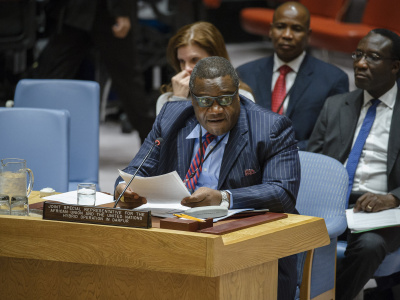
Is meaningful inclusion the next frontier in women in mediation in Africa?
Last week, ECDPM organised a panel during a three-day online consultation on the next European Union (EU) guidelines for mediation and mediation support. With over 700 participants, we virtually put our heads together to think about the future of mediation and whether mediation as we know it is fit for purpose.
For our panel, we invited Mukondeleli Mpeiwa, coordinator of the FemWise-Africa Secretariat, Marie Louise Baricako, a seasoned mediator from Burundi and a founding member of FemWise-Africa, and David Lanz from Swisspeace. Together, we zoomed (pun intended) on the track record of women in mediation in Africa, the role of FemWise-Africa and what the EU could learn from this. We discovered that representation of women in mediation is one thing and real inclusion another.
FemWise-Africa: Institutionalising women in mediation
Women have always taken formal and informal mediation roles in many contexts in Africa, particularly at the local level. As Marie Louise Baricako noted, ‘women are never not involved in peacemaking’. But their inclusion in these processes, particularly in the formal mediation processes even at the local level, was never granted. Women had to claim their space and elbow their way into mediation or broader peacebuilding processes. There is therefore a track record of African women mobilising, forming chains of solidarity across countries and contributing to peacebuilding and mediation, particularly during the 80s and 90s – from Somalia and Liberia to Burundi and the Democratic Republic of the Congo.
At the start of the 21st century, including with the adoption of UN resolution 1325, the call for inclusion of women in peacebuilding and mediation grew lounder. This gave momentum to women’s movements, female mediators and peacebuilders in Africa to then use this normative progress as a way of claiming representation and inclusion in formal mediation processes – not only at the local level (where they had already elbowed themselves in) but also at the national and continental levels.
It was against this backdrop of incremental gain in cementing women’s participation in mediation that FemWise-Africa – a network of African female mediators – was created in 2018 to complement the work of Panel of the Wise of the African Union (AU). In its mere establishment, FemWise formalises the long-standing track record of women’s contribution to peacebuilding.
It also elevates the work of female mediators and demands that they participate not only in track II (unofficial, or informal) and track III (community-based) levels of mediation, but also in track I (high-level mediation) – including in electoral mediation – where the AU leads its preventive diplomacy. Moreover, FemWise-Africa promotes solidarity among African women in mediation and facilitates exchange and intergenerational learning and mentoring.
From representation to inclusion
But institutionalising women’s participation in mediation or ensuring their representation in specific processes doesn’t necessarily mean their views are included. Perhaps the next frontier of female-led mediation is ensuring inclusion. The process of going from representation to genuine inclusion of women in peacebuilding and in mediation is however not straightforward.
Moreover, the question around women’s inclusion should also reflect on democratising the type of women who participate in mediation. Ensuring diversity among female mediators (but also male mediators) based on age, socio-economic status or political affiliation, levels of education, level of experience and contextual familiarity is something that requires more thought.
FemWise is making efforts to nurture existing talent in a given country and expand the sphere of influence of female mediators in the country or specific geographic localities they come from, rather than deploying them elsewhere. This is based on a refreshed appreciation of local capacity and the principle of ‘doing no harm’ to the countries or local contexts which could lose out if female peacebuilders who are already adding value get deployed elsewhere. Supporting women in their own context contributes to their effectiveness as they can capitalise on their existing networks, visibility or influence in their mediation work.
It also helps build systems for sustainable peacebuilding whereby female peacebuilders and mediators stay in their own places of origin or influence to support peacebuilding well after peace agreements have been signed. Mediators often leave too soon after an agreement is signed, and implementation of the agreement falls through the cracks, unless basic social infrastructures exist to sustain peace. This is a key challenge, as the (un)sustainability of peace agreements is one of the main obstacles to ‘silencing the guns’ in Africa.
Making meditation fit for purpose
But sustainability is not the only problem mediation or peacebuilding face in Africa. As our panelists noted, the ‘interference’ of external actors – both by way of well-meaning ‘support’ and interest-based political interventions – undermine peacebuilding. At times, external (international) mediators and peacebuilders come in with their ‘toolboxes’, with limited time and contextual knowledge, yet under huge pressure back home to deliver results – fast. This undermines local initiatives.
There is also interference from invisible conflict actors, who engage in political manoeuvering through proxies. Moreover, the nature of conflicts in different regions in Africa is changing and the tactics, motives and interests of actors are fluid and far from clear. According to Mukondeleli Mpeiwa, this has major implications for mediation and begs the question of whether mediation as we know it is fit for purpose.
Within this fast-changing conflict setting, FemWise-Africa and its members across the region want to adapt and develop ways to respond to conflicts as effectively as possible. Building on the experience of African female mediators, harnessing their potential within their own communities, and strengthening inclusion of mediation networks across the region, FemWise-Africa is exploring the next frontier in mediation.
What can the EU learn from this?
These challenges are also relevant to the EU and its new mediation guidelines. Women’s mediation networks also exist in Europe, and the online consultations for example also discussed the role of EU guidelines for intra-European mediation, in today’s context of growing polarisation. This should also indicate to the EU that mediation is relevant not only beyond, but also within its borders.
Second, male dominance persists in peace mediation initiatives and pools of mediators, also in Europe. Women’s networks such as FemWise-Africa deconstruct the notion that to be effective, mediators need to project ‘strength’, a characteristic often still attributed mostly to men, and provide a powerful message that there is no shortage of capable and strong female mediators.
Moreover, the key lesson for the EU and its mediation support abroad is to tap into existing networks, to use local experiences and capacities, and to ensure more enduring local engagement in mediation processes beyond peace agreements.
The views are those of the authors and not necessarily those of ECDPM.





